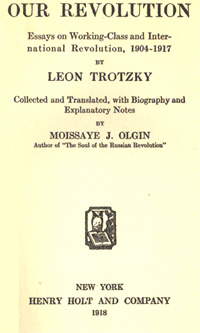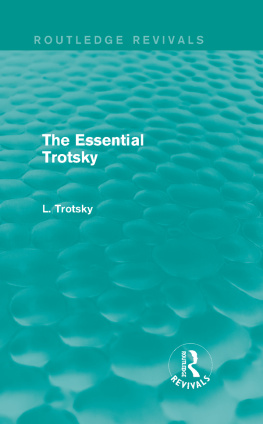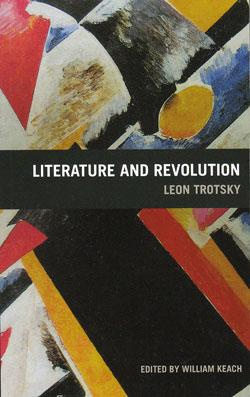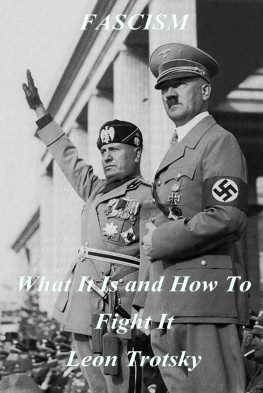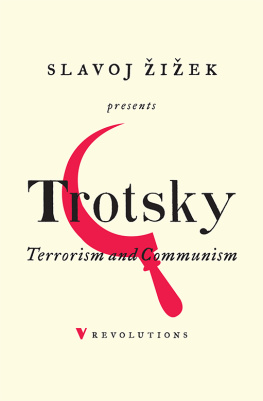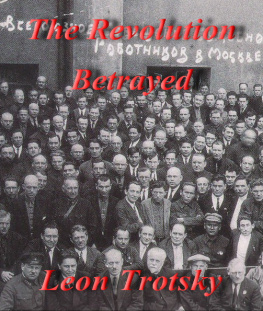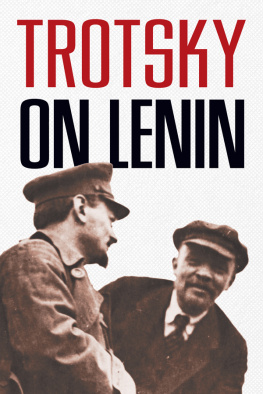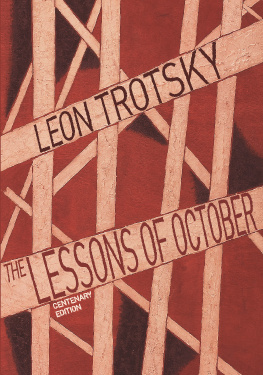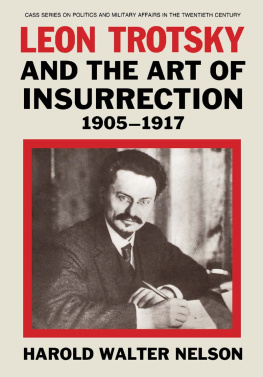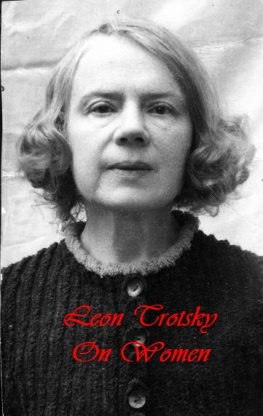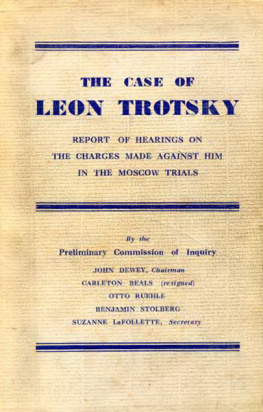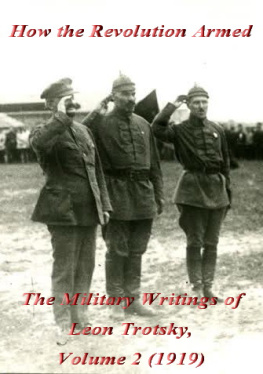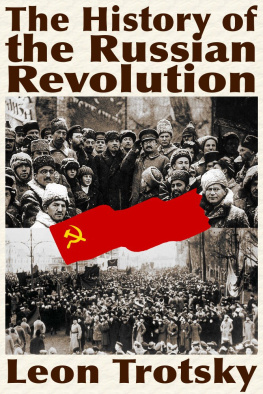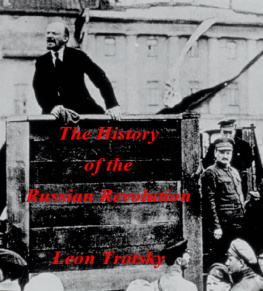Leon Trotsky - Our Revolution - Essays 1904-1917 (1918)
Here you can read online Leon Trotsky - Our Revolution - Essays 1904-1917 (1918) full text of the book (entire story) in english for free. Download pdf and epub, get meaning, cover and reviews about this ebook. genre: Politics. Description of the work, (preface) as well as reviews are available. Best literature library LitArk.com created for fans of good reading and offers a wide selection of genres:
Romance novel
Science fiction
Adventure
Detective
Science
History
Home and family
Prose
Art
Politics
Computer
Non-fiction
Religion
Business
Children
Humor
Choose a favorite category and find really read worthwhile books. Enjoy immersion in the world of imagination, feel the emotions of the characters or learn something new for yourself, make an fascinating discovery.
- Book:Our Revolution - Essays 1904-1917 (1918)
- Author:
- Genre:
- Rating:5 / 5
- Favourites:Add to favourites
- Your mark:
- 100
- 1
- 2
- 3
- 4
- 5
Our Revolution - Essays 1904-1917 (1918): summary, description and annotation
We offer to read an annotation, description, summary or preface (depends on what the author of the book "Our Revolution - Essays 1904-1917 (1918)" wrote himself). If you haven't found the necessary information about the book — write in the comments, we will try to find it.
Our Revolution - Essays 1904-1917 (1918) — read online for free the complete book (whole text) full work
Below is the text of the book, divided by pages. System saving the place of the last page read, allows you to conveniently read the book "Our Revolution - Essays 1904-1917 (1918)" online for free, without having to search again every time where you left off. Put a bookmark, and you can go to the page where you finished reading at any time.
Font size:
Interval:
Bookmark:
The world has not known us Russian revolutionists. The world has sympathized withus; the world abroad has given aid and comfort to our refugees; the world, at times, even admiredus; yet the world has not known us. Friends of freedom in Europe and America were keenly anxious tosee the victory of our cause; they watched our successes and our defeats with breathless interest;yet they were concerned with material results. Our views, our party affiliations, our factionaldivisions, our theoretical groupings, our ideological constructions, to us the leading lights inour revolutionary struggles, were foreign to the world. All this was supposed to be an internalRussian affair.
The Revolution has now ceased to be an internal Russian affair. It has become of worldwideimport. It has started to influence governments and peoples. What was not long ago a theoreticaldispute between two underground revolutionary circles, has grown into a concretehistorical power determining the fate of nations. What was the individual conception of individualrevolutionary leaders is now ruling millions.
The world is now vitally interested in understanding Russia, in learning the history of ourRevolution which is the history of the great Russian nation for the last fifty years. Thisinvolves, however, knowing not only events, but also the development of thoughts, of aims, of ideasthat underlie and direct events; gaining an insight into the immense volume of intellectual workwhich recent decades have accumulated in revolutionary Russia.
We have selected Leon Trotzkys contribution to revolutionary thought, not because he isnow in the lime light of history, but because his conceptions represent a very definite, a clearcutand intrinsically consistent trend of revolutionary thought, quite at from that of other leaders.We do not agree with many of Trotzkys ideas and policies, yet we cannot overlook the factthat these ideas have become predominant in the present phase of the Russian Revolution and thatthey are bound to give their stamp to Russian democracy in the years to come, whether the presentgovernment remains in power or not.
The reader will see that Trotzkys views as applied in Bolsheviki ruled Russia are not ofrecent origin. They were formed in the course of the First Russian Revolution of 1905, in whichTrotzky was one of the leaders. They were developed and strengthened in the following years ofreaction, when many a progressive group went to seek compromises with the absolutist forces. Theybecame particularly firm through the world war and the circumstances that led to the establishmentof a republican order in Russia. Perhaps many a grievous misunderstanding and misinterpretationwould have been avoided had thinking America known that those conceptions of Trotzky were notcreated on the spur of the moment, but were the result of a lifelong work in the service of theRevolution.
Trotzkys writings, besides their theoretical and political value, represent a vigor ofstyle and a clarity of expression unique in Russian revolutionary literature.
As to revolutionary writers, the very character of their work has compelled them to hide theirnames to escape the secret police. Ulyanov, therefore, became Lenin, and Bronsteinbecame Trotzky. As to his camouflaging as a Russian, this assertion isbased on sheer ignorance. Trotzky is not a genuine Russian name no more so than Ostrovski orLevine. True, there was a Russian playwright Ostrovski, and Tolstoi gave his main figure inAnna Karenin the name of Levine. Yet Ostrovski and Levine are well known in Russiaas Jewish names, and so is Trotzky. I have never beard of a Gentile bearing the name Trotzky.Trotzky has never concealed his Jewish nationality. He was too proud to dissimulate. Pride is,perhaps, one of the dominant traits of his powerful personality.
Revolutionary Russia did not question the race or nationality of a writer or leader. One admiredTrotzkys power over emotion, the depth of his convictions, the vehemence of his attacks onthe opponents of the Revolution. As early as 1904, one line of his revolutionary conceptions becamequite conspicuous: his opposition to the liberal movement in Russia. In a series of essaysin the Social-Democratic Iskra (Spark), in a collection of hisessays published in Geneva under the title Before January Ninth, he unremittinglybranded the Liberals for lack of revolutionary spirit, for cowardice in face of a hatefulautocracy, for failure to frame and to defend a thoroughly democratic program, for readiness tocompromise with the rulers on minor concessions and thus to betray the cause of the Revolution. Noone else was as eloquent, as incisive in pointing out the timidity and meekness of the Zemstvoopposition (Zemstvo were the local representative bodies for the care of local affairs, and theLiberal land owners constituted the leading ty in those bodies) as the young revolutionaryagitator, Trotzky. Trotzkys fury against the wavering policy of the welltodo Liberals wasonly a manifestation of another trait of his character: his desire for clarity in politicalaffairs. Trotzky could not conceive of halfway measures, of diplomatic silenceover vital topics, of cunning moves and concealed designs in political struggles. The attitude of aMilukov, criticizing the government and yet willing to acquiesce in a monarchy of a Prussian brand,criticizing the revolutionists and yet secretly pleased with the horror they inflicted uponRomanoff and his satellites, was simply incompatible with Trotzkys very nature and arousedhis impassioned contempt. To him, black was always black, and white was white, and politicalconceptions ought to be so clear as to find adequate expression in a few simple phrases.
Trotzkys own political line was the Revolution a violent uprising of the masses, headedby organized labor, forcibly to overthrow bureaucracy and establish democratic freedom. With whatan outburst of blazing joy be greeted the upheaval of January 9, 1905 the first great massmovementin Russia with clear political aims:
The Revolution has come! he shouted in an ecstatic essay completedon January 20th. The Revolution has come. One move of hers has lifted the people over scoresof steps, up which in times of peace we would have had to drag ourselves with hardships andfatigue. The Revolution has come and destroyed the plans of so many politicians who had dared tomake their little political calculations with no regard for the master, the revolutionary people.The Revolution has come and destroyed scores of superstitions, and has manifested the power of theprogram which is founded on the revolutionary logic of the development of the masses ... TheRevolution has come and the period of our infancy has passed.
The Revolution filled the entire year of 1905 with the battle cries of everincreasingrevolutionary masses. The political strike became a powerful weapon. The village revolts spreadlike wildfire. The government became frightened. It was under the sign of this great conflagrationthat Trotzky framed his theory of immediate transition from absolutism to a Socialistorder. His line of argument was very simple. The working class, he wrote, was the only realrevolutionary power. The bourgeoisie was weak and incapable of adroit resistance. The intellectualgroups were of no account. The peasantry was politically primitive, yet it had an overwhelmingdesire for land. Once the Revolution is victorious, political power necessarily passes intothe hands of the class that has played a leading role in the struggle, and that is the workingclass. To secure permanent power, the working class would have to win over the millions ofpeasants. This would be possible by recognizing all the agrarian changes completed by the peasantsin time of the revolution and by a radical agrarian legislation. Once in power, theproletariat will appear before the peasantry as its liberator. On the other hand, havingsecured its class rule over Russia, why should the proletariat help to establish liamentary rule,which is the rule of the bourgeois classes over the people? To imagine that Social-Democracyparticipates in the Provisional Government, playing a leading role in the period of revolutionarydemocratic reconstruction, insisting on the most radical reforms and all the time enjoying the aidand support of the organized proletariat, only to step aside when the democratic program is putinto operation, to leave the completed building at the disposal of the bourgeois ties and thus toopen an era of liamentary politics where Social-Democracy forms only a ty of opposition, to imaginethis would mean to compromise the very idea of a labor government. Moreover, once therepresentatives of the proletariat enter the government, not as powerless hostages, but as aleading force, the divide between the minimum program and the maximum program automaticallydisappears, collectivism becomes the order of the day, since political supremacy ofthe proletariat is incompatible with its economic slavery. It was precisely the same programwhich Trotzky is at present attempting to put into operation. This program has been his guidingstar for the last twelve years.
Font size:
Interval:
Bookmark:
Similar books «Our Revolution - Essays 1904-1917 (1918)»
Look at similar books to Our Revolution - Essays 1904-1917 (1918). We have selected literature similar in name and meaning in the hope of providing readers with more options to find new, interesting, not yet read works.
Discussion, reviews of the book Our Revolution - Essays 1904-1917 (1918) and just readers' own opinions. Leave your comments, write what you think about the work, its meaning or the main characters. Specify what exactly you liked and what you didn't like, and why you think so.

